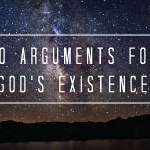Deciding to Believe
by Matt Fradd
Filed under Belief
Sometimes, after reflection and study, people feel that they can’t decide between atheism and belief in God. Where they are at that moment, the evidence seems too evenly weighted or too difficult to evaluate.
What then?
If these are the two belief systems that you feel torn between then there are two basic choices: You could choose to go ahead and believe in God or you could refrain from doing so.
If it seems impossible to decide between these options based on the evidence then one can legitimately consider the advantages of choosing one course of action over the other.
Four Possible Scenarios
What would the results be of your choice, depending on whether God really exists? There are four possible scenarios:
A. You choose to live as if God exists and you are correct: God does exist.
B. You choose to live as if God does not exist, and you are incorrect: God does exist.
C. You choose to live as if God exists, and you are incorrect: God does not exist.
D. You choose to live as if God does not exist, and you are correct: God does not exist.
If A is the case then you stand to receive the infinite good of everlasting life!
If B is the case then you risk missing out on this infinite good.
If C is the case then what awaits you after this life is not heaven but non-existence. During life you would have had a bit of inconvenience due to living as a believer and having to deny yourself certain things, but that is not as much of a problem as it might seem, since studies show believers tend to live longer, healthier, and happier lives.
If D is the case then you would have a bit more freedom to indulge your lower passions in this life, but that is not as much a gain as it might seem, since you would also miss out on the benefits that religion brings to people’s lives, including a sense of purpose and meaning that there is no rational basis for if we are just walking bags of chemicals.
Comparing these four options, A would result in you achieving infinite gain, B would result in you missing this gain, and C and D would both involve small, finite gains or losses determined by the limitations involved in living as a believer and the benefits gained in this life by doing so.
That being the case, if you feel torn between atheism and belief in God, and if you feel that you can’t decide based on objective evidence, then your rational choice would be to go with belief in God. You stand to achieve an infinite good (if you are right) but only a finite loss at most (if you are wrong). By contrast, if you choose not to believe in God then you risk an infinite loss (if you are wrong) at at most a finite good (if you are right).
Rational self-interest, which is certainly part of human nature whether you believe God built it into us or not, clearly points toward believing in God.
Not an Argument for God’s Existence
Bear in mind that this is not an argument for Gods existence but rather an argument for belief in God’s existence. It doesn’t argue directly that he exists but that, in certain circmstances, it is rational for us to choose to believe in him.
It also is not an argument designed for every possible situation. It is designed for those who feel torn between atheism and belief in the kind of God that Christianity proposes, but who aren’t at a point where they feel that they can settle the question by objective evidence. If you are in that situation, then this argument can help you.
Some might have a concern that they would be doing something morally wrong if they were to choose belief in God without objective proof, but this argument can be turned on its head.
If atheism were true then there would be no objective moral values, and thus by definition your choosing to believe in God would not be morally wrong. You would be completely innocent in believing. There couldn’t be anything wrong with believing if there were no such thing as right and wrong to begin with.
Make Your Move
There are many times in life when we must make decisions about what we will believe without having conclusive proof. Such proof is a luxury that we often do not have.
If you waited, for example, to have conclusive proof that a prospective spouse will always be faithful to you and never betray you then you will never get married. In fact, in trying to obtain conclusive proof, you would likely crush the relationship between you before you were even engaged.
At some point, you must decide that you have “enough” to make the commitment and choose to embark on a life together, even without total proof. Given the fears and anxiety that often accompany the act of getting married, many people find themselves in a situation where, at least at the moment, they don’t know how to evaluate the evidence anymore and they must take a leap of faith to marry.
Something very similar applies to the decision to believe in God. Like marriage, it is a momentous, life-changing choice, and that can interfere with our ability to rationally evaluate evidence. When that happens, deciding based on self-interest is rational.
God understands that. In fact in the gospels Jesus appeals to our rational self-interest, asking, “For what shall it profit a man, if he shall gain the whole world, and lose his own soul?” (Mark 8:36).
Related Posts
Note: Our goal is to cultivate serious and respectful dialogue. While it's OK to disagree—even encouraged!—any snarky, offensive, or off-topic comments will be deleted. Before commenting please read the Commenting Rules and Tips. If you're having trouble commenting, read the Commenting Instructions.














